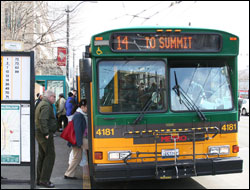Feb. 20, 2008
Transit Now partners help deliver even more new service for commuters
Groundbreaking partnership to put 132,000 hours of new service on the street
 By splitting costs of new bus service with cities and other partners, King County Metro will add four new bus routes and more frequent trips on 25 existing routes in a first-of-its-kind partnership program approved by voters of the Transit Now Initiative. Riders will see an estimated 132,000 hours of new service phased in over the next six years.
By splitting costs of new bus service with cities and other partners, King County Metro will add four new bus routes and more frequent trips on 25 existing routes in a first-of-its-kind partnership program approved by voters of the Transit Now Initiative. Riders will see an estimated 132,000 hours of new service phased in over the next six years.
The proposed $14.5 million annual investment in 16 partnerships recommended by the King County Executive puts more bus service on the streets all across the county. After a comprehensive competitive process, the Executive is recommending that nearly half of the partnership service will be in Seattle and the rest distributed among Auburn, Bellevue, Federal Way, Issaquah, Kent, Redmond, Renton and Sammamish. These partnerships follow an initial service agreement last year with Children's Medical Center. That partnership is delivering expanded service on two bus routes serving Northeast Seattle residents and Medical Center employees, patients and visitors.
"These partnerships help cities and companies get additional service on the street sooner than they might get it otherwise," said Executive Sims. "This type of innovation and collaboration is an essential part of getting more people out of their cars and on to mass transit."
Metro reviewed and ranked more than 20 partner proposals using a transparent process and criteria created by the Metropolitan King County Council last May. The two types of partnerships funded are direct financial partnerships where the city or business picks up one third of the cost for a minimum of five years and speed-and-reliability-partnerships where bus service is increased in return for improved traffic operations that increase the speed of buses in a particular area.
Criteria for granting partnerships included improved service to urban and manufacturing centers, circulation within urban areas, strengthening high ridership core service connections, exceeding the five year funding commitment to pay one third of costs as well as meeting other goals of the Countywide Planning Policies, the Six-Year Transit Development Plan and the Six-Year Service Strategy.
Through this program, Metro will provide 90,000 annual service hours with its partners paying for an additional 42,500 hours of new service.
Metro is proposing to phase in partnerships over a six-year period beginning this fall. Fourteen proposals involve direct contributions from partners offering to pay at least one-third of the cost of the new service, while two proposals come from cities willing to invest in street improvements that boost transit speeds by at least 10 percent. When all the partnerships are in place, Metro will invest almost $10 million annually with its partners contributing more than $4.5 million.
If the agreements are approved, Metro and its partners will add service on 25 existing routes in the coming years. Improvements Metro proposes to offer this year include:
- More service on nine Seattle routes serving the Central District, Capitol Hill, Wallingford and Fremont;
- A partnership between the cities of Sammamish, Redmond, Issaquah and the Microsoft corporation to increase weekday peak service on the Route 269 serving neighborhoods from Overlake to Issaquah;
- A partnership between the cities of Renton and Kent to add midday service on the Route 153; and
- A partnership between the city of Redmond and Microsoft to continue the Route 644 between Kenmore and Redmond after state funding runs out in September 2008.
In addition to more frequent service, Metro is recommending four new bus routes be created in the coming years, including: a new Route 913 connecting residential areas with downtown Kent; a new shuttle providing peak-hour service between Lakeland Hills and Auburn Station; a new circulator in downtown Bellevue; and a new route connecting Seattle's First Hill to Colman Dock, King Street Station, and International District Station.
The proposals were selected following an open competitive process. As part of its review, Metro considered factors such as the proposal's ability to link growing urban areas and provide congestion relief in busy downtown urban centers. Partners were also required to make a commitment to support the program for at least five years.
"The cities and employers partnering with Metro are doing more than supporting new travel options in their communities," Sims said. "They are collectively serving as a model for how transit can be strengthened to enhance the vitality of our economy and region for years to come."
The service partnership program is a key element of Transit Now - a 10-year plan approved by voters in 2006 to expand Metro service by up to 20 percent. Over the past year, Transit Now has already increased transit options in communities such as lower Queen Anne, Capitol Hill, First Hill, Ballard, the University District, Juanita, Kenmore, Kirkland, Bellevue, Redmond, and on South King County routes serving Renton, Tukwila, SeaTac, and Burien.
By the end of 2008, an estimated 100,000 hours of new bus service will be on the street since voters approved Transit Now.
The partnership package now goes to the King County Council for approval. Metro proposes to phase in initial service hours funded through the partnership program in September.
Learn more
- Transit Now: service partnerships (PDF)
- Service Maps (PDF)
- Metro to boost bus service, Seattle Post Intelligencer
- Metro to add service on 25 bus routes, Seattle Times


